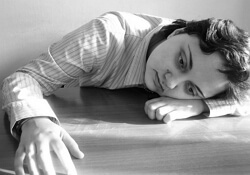Obsessive-compulsive personality disorder
 Currently in our society there is an abundance of people whose personality is focused on the problems of thinking and doing. And if the process of thinking, as well as doing, turns into a motive psychological motive, when there is a disproportion in the ability to feel, intuitively understand, feel, listen, dream, play, enjoy the contemplation of works of art, then in this case we are talking about obsessive-compulsive disorderPersonality. A large number of remarkable, well-known, highly productive people "workaholics" are subject to this condition.
Currently in our society there is an abundance of people whose personality is focused on the problems of thinking and doing. And if the process of thinking, as well as doing, turns into a motive psychological motive, when there is a disproportion in the ability to feel, intuitively understand, feel, listen, dream, play, enjoy the contemplation of works of art, then in this case we are talking about obsessive-compulsive disorderPersonality. A large number of remarkable, well-known, highly productive people "workaholics" are subject to this condition.
But there is a separate part of people for whom doing is not of value, and thinking in opposition is such a process. Under the obsessive-compulsive personality disorder fall teachers of philosophy, which, sometimes, have an obsessional character of personality and do not have compulsive features of the disorder. The teaching staff receives satisfaction and thereby raises their own sense of dignity through the thought process and does not feel the need to translate their ideas. Further, for example, carpenters, as well as accountants, often fall under the compulsive, but not obsessive type. Pleasure with obsessive-compulsive personality disorder is obtained from scrupulous performance of a number of specific tasks, often requiring little mental effort. It happens that individuals who do not gravitate toward compulsive rituals, come to the therapist about getting rid of obsessive thoughts, but there are also those who are with a return complaint.
Obsessive and compulsive tendencies often exist, and also alternate among themselves in one person, while revealing a similar dynamics of their development. Attention should be paid to the fact that obsessive states( persistent, undesirable thoughts) and compulsive aspirations( unwanted, persistent actions) can appear in people who do not necessarily have obsessive or compulsive character. However, it should be noted that obsessive-compulsive personality disorder will inevitably cause obsessive thoughts or actions under the irresistible influence of attraction. The name of the obsessive-compulsive disorder, the person has received as a psychological style is endowed with the same protections that are involved in causing obsessive and compulsive symptoms
Obsessive-compulsive personality disorder -
symptoms of OCD is very distrustful people who are not inclined to take decisive action andWith a clearly dominant calm. Very easily and quickly excited.
The main signs of obsessive-compulsive personality disorder are very painful, obsessive thoughts, drives, images, and actions. He who has suffered from them suffers and resists.
People with obsessive-compulsive personality disorder, endowed with qualities such as orderliness, stubbornness, greed, stubborn, self-discipline, perfectionism, punctuality, thoroughness, economy, the propensity to imaginations and moralizing( empty verbiage), rigidity of thought, lack of adaptationAbilities, very conscientious, like order and discipline, perseverance over insurmountable obstacles. They are very reliable and they can be relied on in everything, they are people of high standards, as well as ethical values. Their practicality, accuracy, scrupulousness with respect to moral requirements is amazing. In the event of stress, as well as increased stress, personality traits are transformed into symptoms of obsessive-compulsive disorder, which can further acquire the character of the
ritual Obsessive-compulsive disorder - examples of
For example, Mark Chapman, whose obsession with John Lennon led to the compulsive prompting of the murder or LadyMacbeth is a literary example with her washing hands.
For example, a widow completely absorbed in the care of her husband's burial can not emotionally survive the grief.
Obsessive persons occupying administrative posts, neither to themselves, nor to others, do not give rest and relaxation
Obsessive-compulsive personality disorder - causes of
This may be because the wrong upbringing of their children by parents who adhere to an authoritarian parenting style: the grim austerity of total control, condemnation. The child develops a constant sense of anger, as well as aggressive fantasies( often about defecation, which for the child appears as bad, dirty and shameful).The child's need to be controlled, clean, punctual, reasonable becomes essential for self-esteem in the future.
The main conflict of obsessive-compulsive people is anger when they are under control and in parallel struggle with fear of punishment or conviction. At the same time, doctors notice that affect in sick people is crushed, and also rationalized, and words are used to conceal feelings, and not to express them. Often, any therapist distinguishes those moments when, at the time of the interview of an obsessive patient, the sick person can not express his opinion on a particular situation.
doctors often notice the presence in obsessional personalities irrational irritation, but the patient denies that mad and angry, and sick may kill the therapist, to express dissatisfaction with the facial expressions, thus showing a latent aggression.
An inherent sense of shame in the form of sadness, the sickness manifests itself when they realize that they do not reach personal standards in the face of the therapist.
or OCD( obsessive compulsive disorder), personality is manifested in the protective and adaptive processes that occur in isolation when obsessions and destruction made under compulsion. When combining obsessia and compulsions, the diseased applies both protections. As for highly productive obsessive personalities, they do not use isolation as an extreme. Instead, they tend to avoid an unpleasant object( separation of affect), rationalism, moralizing, and intellectualization. Often, the sick are prone to reactive education - the emergence of a conflict between desire and prohibition. No less important symptom of obsessive-compulsive personality disorder is the shift in affect( the transfer of feelings, as well as emotions from one object to another).This is especially true of anger.
Obsessive-compulsive personality disorder manifests itself in thought processes, as well as cognitive abilities. Such persons put their feelings in the depreciated realities. Consequently, they are often discouraged when they find themselves in a situation where fantasies, emotions and physical sensations are important.
People with obsessive-compulsive personality disorder is often easier to perform formal social roles, as opposed to roles in the intimate and the domestic sphere. With the love of attraction and attachment, they are not able to express their affection and in this case they do not experience anxiety and shame, so often moved to the emotional interaction between cognitive depressing. At the therapist's reception patients with obsessive-compulsive personality disorder use the description of emotions in the second person. For example, when asked about sexual relations, the person who is ill will answer: I carry out this work.
In patients with borderline conditions, as well as psychotics with dyslexia, isolation gets protection and such people seem schizoid. Distinctive moments between obsessive-compulsive personality and schizophrenic-paranoid concluded that schizophrenic in an isolated room, where there is no danger starts to present paranoid delusions and obsessive-compulsive patient takes up harvesting
premises Obsessive-compulsive personality disorder - Treatment
PeopleVery rarely seek treatment for obsessive-compulsive personality disorder. The ill person needs the need to constantly perform certain actions, often useless or harmful. For example, the schizoid patient avoids people, and the paranoid suspects them, whereas the psychopath interacts with them in an unusual way.
Used in the treatment of obsessive-compulsive disorder, antidepressants, such as tricyclic - Melipramine;Tetracyclic( Mianserin, Ludomil, Maprotiline), anticonvulsants such as carbamazepine, in behavioral therapy paradoxical intention is applied, psychoanalysis, and in severe obsessions, electroconvulsive therapy
More articles on the topic:
1. Obsessive-compulsive disorder
2. Paranoid schizophrenia
3. Psychosis of



